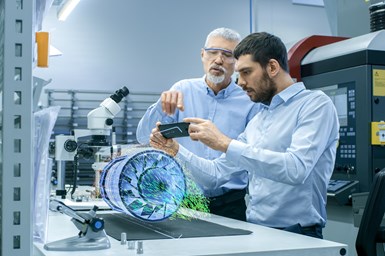Virtual Reality Training Simulates Manufacturing Operations
Tooling U-SME Virtual Labs provides realistic, immersive experiences for learners to work with simulated equipment and real-world manufacturing situations.
Tooling U-SME, a leading provider of manufacturing training solutions, launched Virtual Labs at its annual tuXperience in Pittsburgh, Pennsylvania.
The new virtual reality training curriculum is said to enhance productivity, increase safety, lower costs and engage a younger workforce.
Using a Meta Quest 2 headset or a desktop or laptop computer, trainees tap into applied learning through virtual reality. By providing realistic, immersive experiences for learners to work with simulated equipment, Tooling U-SME Virtual Labs accelerate competency for real-world manufacturing situations.
Tooling U-SME’s blended learning approach is said to separate its immersive training from existing options, and Virtual Labs are the centerpiece of its applied learning model. The approach was successfully tested and streamlined through an 18-month pilot program with manufacturers of varied sizes.
First, learners build on the knowledge acquired in the prerequisite Tooling U-SME online classes covering subjects from machining, maintenance and welding to Smart skills such as additive, digital, cybersecurity, robotics and automation. Trainees then put this knowledge into practice as they navigate the virtual environment, demonstrating that they can understand and follow instructions, perform tasks in a manufacturing setting and answer questions. Finally, through on-the-job training, they perform each task on the shop floor or in the classroom.
According to the company, Meta headsets were selected because they are relatively inexpensive and easy to use, providing a low barrier to entry for any user. As an alternative, computer-based Virtual Labs, available on laptops and desktops, offer a virtual environment that is similar to computer gaming, eliminating barriers to those without a headset.
Virtual Labs will cover subjects such as safety, inspection, assembly, welding and additive. For each Virtual Lab, customers receive a comprehensive skills guide that provides a structured way to set up and integrate the new technology into a blended learning approach.
Related Content
-
VIDEO: Perspective on A.I. and Mold Design
Bill Genc of TopSolid shares his perspective on the benefits of and barriers to using artificial intelligence in mold design.
-
Outlook for Automation in 2024
I want to share an article I found that discusses the reasons manufacturers should adopt automation in 2024 as a strategic response to global uncertainties, reshoring requirements, labor shortages and the pursuit of increased productivity.
-
How to Use Scientific Maintenance for More Accurate Mold and Part Troubleshooting
Discover how adopting scientific maintenance approaches helps improve mold lifespan, minimize failures, and optimize production outcomes.

















